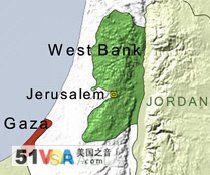Rafat, West Bank
01 August 2009
Israel and the Palestinian territories are suffering a fifth year of drought. Water shortages are especially acute in the West Bank, where an aquifer shared by Israelis and Palestinians is being depleted. The World Bank recently reported Israelis are receiving four times as much water per capita than West Bank Palestinians, a situation resulting from the breakdown of the peace process and the Palestinian Authority's failure to build infrastructure.
 |
Family members rush to take advantage of every precious drop before the afternoon, filling plastic jugs, oil drums, and pails with water for use by the 15 people who live in this home.
Intifar Sabre Abu Hassan, one of the women of the family, says she knows the taps will run dry by the afternoon, and then stay dry for several days ahead. She hurries to knead the dough for the bread her family will eat all week.
She says that on this day that they have water from the taps, her family bathes, does laundry, washes dishes, cooks, and flushes toilets. She says these are things a human needs to do.
Resources overdrawn
But the Mahmouds, like many other Palestinian families in the West Bank do not have access to much of the water in the ground beneath them.
They live above the Mountain Aquifer, which the Palestinians share with Israel and its settlements in the West Bank.
Gidon Bromberg is the Israeli director of the Friends of the Middle East, an environmental group that has long been monitoring use of the aquifer.
"With five consecutive years of drought, the Mountain Aquifer has been terribly over-pumped," said Bromberg. "In fact, all water resources in Israel and shared between Israel and Palestine, have been overdrawn. Israel takes the lion's share of the Mountain Aquifer. Some 80 percent of the waters of the Mountain Aquifer go to Israel and only 20 percent go to Palestinians in the West Bank. And therefore, it's also a source of animosity between the peoples."
Nearing catastrophe
A World Bank report issued this year says the average Israeli gets four times as much water as the average Palestinian. It warns of a nearing catastrophe.
For Intifar's father, Mahmoud Abu Ibrahim, a farmer in his 80s whose crops depend on rainfall, the catastrophe is here.
He stoops over some drying tomato plants in his field, pulling the dried stalks and leaves and tossing out shriveled up tomatoes that have fallen from the plants.
He says there is no water. The soil is dry. All the tomatoes are spoiled. He says there is nothing to harvest.
In the nearby village of Qattana, no water has been pumped for days.
Adults and children come from kilometers away to line up with plastic jugs and soft drink bottles at a single tap that is connected to a spring.
This 17-year-old boy says he spends long days carrying water back to his family's home. He blames the Israelis for the shortage.
He says he has to come here because there is no water, and he believes it is the Israelis' fault.
Israel itself is suffering from acute shortages and is carrying out a conservation campaign. However, signs of the shortage are much less visible in cities like Jerusalem, where taps have yet to go dry. Fountains in public places are flowing and sprinklers in public parks irrigate vast green lawns using tap water.
Easing water shortages
Israeli officials say one way they are trying to ease water shortages in the West Bank is by pushing a project - along with Jordan - to channel water from the Red Sea to the Dead Sea.
Israeli Vice Prime Minister Silvan Shalom, who also serves as minister for regional development, told reporters recently the project to pump millions of cubic meters of saltwater uphill to the Palestinian territories also aims to save the Dead Sea from drying up, and boost tourism.
"We would have, of course, desalinated water," he said. "There is a lack of water in all the region, especially in Jordan and for the Palestinians."
But some warn the plan is environmentally risky and expensive. On the Palestinian side, management problems and other obstacles are holding up infrastructure projects.
Environmentalist Gidon Bromberg says a joint Israeli-Palestinian water commission that was supposed to address water issues has not been doing its job.
"The whole framework of the joint water committee, with the souring of the of peace process, became antagonistic," he said. "Rather than being a mechanism of cooperation, of joint fact-finding, of assistance to one another, it became another focal point for animosity and a failure, really, to work together to solve the desperate needs of both peoples."
Water is one of the issues that are supposed to be dealt with in final status negotiations. With the peace process stalled, there is little hope for a quick solution.
In the meantime, Intifar Sabre Mahmoud Abu Hassan and her family are doing their best to cope.
She says her family is trying to be careful with water, and trying to economize and ration. She wonders what else they can do.
For now, the Mahmoud family and others have no choice but to keep containers ready for the days when water does flow through the taps.